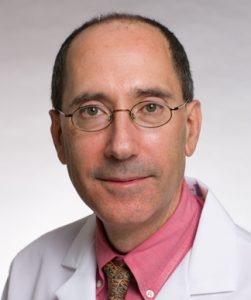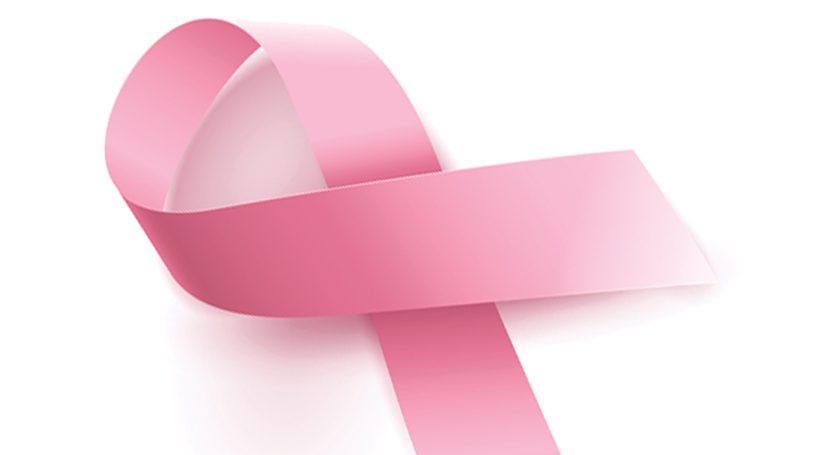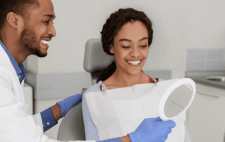From well-attended cancer walks to pink-ribbon-laced events, there’s a lot of awareness surrounding breast cancer. But even still, there’s a lot of misconceptions about the disease and its treatments. Here’s what you need to know, according to some of South Jersey’s top breast cancer doctors.
Breast cancer can affect anyone
When people think of breast cancer patients, they often think of middle-aged women. But in reality, there is no “typical” breast cancer patient, says Kristin Brill, MD, of Sidney Kimmel Cancer Center – Jefferson Health.

Kristin Brill, MD
“Breast cancer is a disease that spans all ages, that has different presentations, different prognoses and different types of treatments,” says Brill.
“There’s this idea that young women can’t get breast cancer, but I’ve seen patients diagnosed as early as 22,” says Brill.
While it doesn’t happen as often, it’s important to know what’s possible so you don’t ignore any warning signs.
“A lot of women will say, ‘Well, I don’t have a family history, so I don’t think I could have breast cancer,’” Brill says. “In reality, almost 80% of newly diagnosed breast cancer cases have no first-degree relatives with the disease.”
Family history is an indicator to keep an eye on any abnormal symptoms like body fluid, lumps and persistent breast pain, but even if you don’t have a family history or you fall outside the scope of a “typical” patient, you shouldn’t let your guard down, she says.
Screening and diagnosis are not the same
While breast cancer screenings are key for early detection, they don’t prevent cancer from striking, says Nandini Kulkarni, MD.

Nandini Kulkarni, MD
“Women put so much stock into these screenings, which is great because they can make a difference in early diagnosis,” says Kulkarni, an oncologist at Inspira Medical Group Surgical Oncology Vineland. “But they don’t protect you from cancer. I have so many women look at me incredulously and say, ‘But I got a mammogram every year, I’ve done everything right.’”
Lately, there’s been even more misconceptions surrounding mammograms, she says. When the pandemic first started, many women avoided their annual screenings in fear of catching Covid in the doctor’s office. And now she’s hearing about a new concern: the vaccine.
“I’ve also had patients ask me if their breast abnormality could be a result of the vaccine, and I’ve had to explain that their breast cancer had nothing to do with the vaccine,” says Kulkarni. The vaccine can sometimes cause reactions, such as enlarged lymph nodes under the vaccine arm, but it’s only temporary. “We suggest that women get their screenings before the vaccine,” she says, “or wait 4-6 weeks after the vaccine to avoid any unnecessary cancer scares.”
You have options
When women are diagnosed with breast cancer, they immediately think they need chemotherapy, says Kamel Abou Hussein, MD, a hematologist and medical oncologist at MD Anderson Cancer Center at Cooper. But there’s much more to the story. “Treatment is often a multidisciplinary approach,” he says.

Kamel Abou Hussein, MD
When a patient is first diagnosed, doctors create a plan based on the stage of the disease. Treatment for early-stage disease will aim to cure the cancer, while a Stage 4 treatment plan may focus on keeping the patient alive as long as possible, says Hussein. There are a lot of options, which are just that, he says – options.
“100% of the time, patients have a say in their own treatment,” he says. Patients often focus on surgery, he says, but surgery may not completely eliminate the cancer or guarantee it won’t come back.
“Women often think a mastectomy can completely cut out the cancer and keep it away, so they avoid the need for chemotherapy,” says Hussein. “While it can help quite a bit, there are no guarantees, and that’s why it’s so important to discuss an entire plan.”
Support matters
Going through breast cancer is a very personal experience and having a good support system can make a significant difference, says James Crawford, MD, a Virtua Health breast surgeon.

James Crawford, MD
A patient’s care team is often the first line of support.
“Patients have all kinds of fears, and you want to be there to reassure them that a diagnosis does not immediately mean they are dying,” says Crawford. “A successful doctor-patient relationship shows that you’re listening to their concerns and their fears while also making sure they’re equipped with all the knowledge they need to fully understand their own health.”
Then, he advises patients turn to family or friends. The bigger the network the better, he says, so patients feel supported without placing too much emotional responsibility on a small group.
“People want to be there for each other, but it can be very overwhelming, especially on a long-term basis,” he says. “As a support person, it’s important to know that it’s ok if you need help too.”
There can be long-term effects
Even with effective treatment, many women experience symptoms well after chemotherapy or surgery, says Maurice Cairoli, MD, a breast cancer and oncology specialist at Regional Cancer Care Associates in Moorestown.

Maurice Cairoli, MD
“One of the biggest difficulties is that chemotherapy can cause premature menopause,” says Cairoli. “Women in their 30s and 40s are suddenly asked to confront something that would otherwise happen in their 50s, and that comes with the loss of the ability to start or continue a family, which is especially hard on a lot of women.”
Premature menopause often brings on the potential for developing osteoporosis, weight gain, hot flashes, night sweats and an impacted sex life.
But the most common long-term effect, specifically for women who have undergone surgery, are changes that come with a mastectomy, says Cairoli.
“Physically, women experience symptoms like swelling of the arm or armpit, restricted arm or shoulder motion, stiffness, tightness, pain or loss of sensation,” he says. “But just as importantly, there’s a psychological element. It affects the way they carry themselves, the way they can wear clothing, how they feel about themselves. It’s important, and not something patients or physicians should overlook.”














